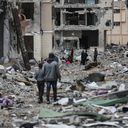What to know about South Africa's genocide case against Israel at the ICJ

The International Court of Justice is set to hold two days of preliminary hearings beginning Thursday on South Africa's case accusing Israel of committing genocide in Gaza.
The big picture: Israel has rejected the allegations as "atrocious and preposterous." But the case could have serious implications for its global reputation and set a legal precedent.
What is the ICJ?
The ICJ, also known as the World Court, was established by the UN Charter in 1945 to settle disputes between countries. It's one of the UN's six primary organs and is located in The Hague.
- The court consists of 15 judges elected to nine-year terms. Israel and South Africa are each allowed to add one ad hoc judge of their choosing to the panel.
How genocide is defined in international law
The term "genocide" was legally defined and criminalized by the 1948 Convention on the Prevention of the Crime of Genocide, which took effect in 1951.
- Under the Convention, genocide is defined as "acts committed with intent to destroy, in whole or in part, a national, ethnical, racial or religious group."
- Acts of genocide against those groups include killings, serious bodily or mental harm, measures to prevent births, and forcible transfer of children from one group to another.
Genocide has been historically difficult to prove at international courts. That is largely because of the vagueness of the legal definition, experts previously told Axios.
- First, it only applies to the four groups — national, ethnical, racial or religious — included in the Genocide Convention.
- Second, it doesn't give a clear threshold for determining when the listed acts constitute genocide.
- And the third and main challenge is often proving intent, the experts said.
Between the lines: The ICJ shouldn't be confused with the International Criminal Court, which was established via a treaty and tries individuals for war crimes, genocide, crimes against humanity, and the crime of aggression.
What South Africa alleges
In its 84-page brief, South Africa argues Israel's military operation in Gaza violates its obligations under the 1948 Genocide Convention.
- Pretoria alleges Israel's actions "are genocidal in character because they are intended to bring about the destruction of a substantial part" of the Palestinian population in Gaza.
- It argues the killing of Palestinians, causing them serious physical and mental harm, and "inflicting on them conditions of life calculated to bring about their physical destruction" constitutes genocide. It also accuses Israeli officials of making statements that express "genocidal intent."
- South Africa's case has been backed by several Arab or Muslim-majority countries, including Turkey and Jordan.
How Israel responded
Israel immediately rejected the accusations, calling them "blood libel" — a reference to the false accusations that originated during the Middle Ages that Jewish people used the blood of Christians for religious rituals.
- Israeli President Isaac Herzog told U.S. Secretary of State Tony Blinken this week that "there is nothing more atrocious and preposterous" than the case.
- Israel says it has a right to defend itself following the Oct. 7 Hamas attack.
Ahead of the hearing, Israel instructed its embassies to press their host countries to issue statements against the case, according to a copy of a memo obtained by Axios' Barak Ravid.
- The cable noted that a "ruling by the court could have significant potential implications that are not only in the legal world but have practical bilateral, multilateral, economic, security ramifications."
The U.S. has remained steadfast in its support for Israel, calling the case "meritless, counterproductive, and completely without any basis."
What to expect
The case will likely take years, but Pretoria has asked the ICJ to issue urgent provisional measures, including ordering Israel to suspend its military operation in Gaza, while the lawsuit proceeds.
- A decision on any provisional measures could come in a matter of weeks.
- To issue provisional measures, the ICJ only has to decide that at first glance — or prima facie — it has jurisdiction, and at least some of the acts South Africa has complained of fall under the Genocide Convention.
Yes, but: The ICJ has no real enforcement powers.
- Russia ignored the court's order in 2022 to halt its invasion of Ukraine.
Even if the court doesn't issue provisional measures, it could still decide it has jurisdiction and proceed with the case.
Go deeper: Gaza's entire population facing crisis levels of hunger, risk of famine, report finds